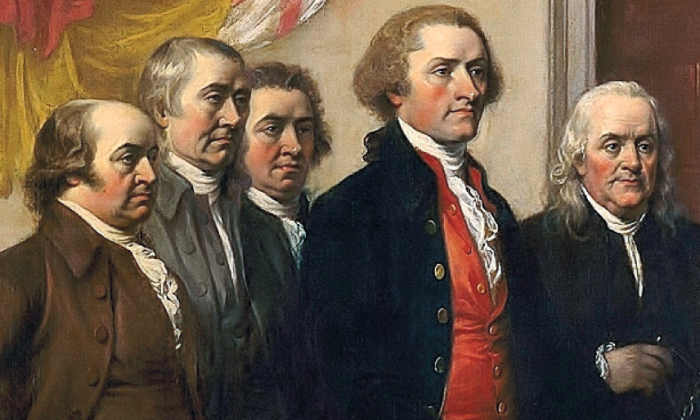The Founding Fathers Knew that Debt-Financed Wars Ruin the Country
Thomas Jefferson said: “It is incumbent on every generation to pay its own debts as it goes — a principle which if acted on would save one-half the wars of the world.” He was right.
The father of modern economics – Adam Smith – agreed: “Were the expence of war to be defrayed always by a revenue raised within the year [instead of financing it with long-term public debt], the taxes from which that extraordinary revenue was drawn would last no longer than the war.”
The ability of private people to accumulate, though less during the war, would have been greater during the peace than under the system of funding. War would not necessarily have occasioned the destruction of any old capitals, and peace would have occasioned the accumulation of many more new. Wars would in general be more speedily concluded, and less wantonly undertaken. The people feeling, during the continuance of the war, the complete burden of it, would soon grow weary of it, and government, in order to humour them, would not be under the necessity of carrying it on longer than it was necessary to do so. The foresight of the heavy and unavoidable burdens of war would hinder the people from wantonly calling for it when there was no real or solid interest to fight for. The seasons during which the ability of private people to accumulate was somewhat impaired, would occur more rarely, and be of shorter continuance. Those on the contrary, during which that ability was in the highest vigour, would be of much longer duration than they can well be under the system of funding.
Libertarian economics writer Lew Rockwell noted in 2008:You can line up 100 professional war historians and political scientists to talk about the 20th century, and not one is likely to mention the role of the Fed in funding US militarism. And yet it is true: the Fed is the institution that has created the money to fund the wars. In this role, it has solved a major problem that the state has confronted for all of human history. A state without money or a state that must tax its citizens to raise money for its wars is necessarily limited in its imperial ambitions. Keep in mind that this is only a problem for the state. It is not a problem for the people. The inability of the state to fund its unlimited ambitions is worth more for the people than every kind of legal check and balance. It is more valuable than all the constitutions every devised.
***
Reflecting on the calamity of this war, Ludwig von Mises wrote in 1919
One can say without exaggeration that inflation is an indispensable means of militarism. Without it, the repercussions of war on welfare become obvious much more quickly and penetratingly; war weariness would set in much earlier.
***
In the entire run-up to war, George Bush just assumed as a matter of policy that it was his decision alone whether to invade Iraq. The objections by Ron Paul and some other members of Congress and vast numbers of the American population were reduced to little more than white noise in the background. Imagine if he had to raise the money for the war through taxes. It never would have happened. But he didn’t have to. He knew the money would be there. So despite a $200 billion deficit, a $9 trillion debt, $5 trillion in outstanding debt instruments held by the public, a federal budget of $3 trillion, and falling tax receipts in 2001, Bush contemplated a war that has cost $525 billion dollars — or $4,681 per household. Imagine if he had gone to the American people to request that. What would have happened? I think we know the answer to that question. And those are government figures; the actual cost of this war will be far higher — perhaps $20,000 per household.
***
If the state has the power and is asked to choose between doing good and waging war, what will it choose? Certainly in the American context, the choice has always been for war.Progressive economics writer Chris Martenson explains as part of his “Crash Course†on economics:If we look at the entire sweep of history, we can make an utterly obvious claim: All wars are inflationary. Period. No exceptions.
***
So if anybody tries to tell you that you haven’t sacrificed for the war, let them know you sacrificed a large portion of your savings and your paycheck to the effort, thank you very much.Blanchard Economic Research pointed out in 2001:War has a profound effect on the economy, our government and its fiscal and monetary policies. These effects have consistently led to high inflation.
***
David Hackett Fischer is a Professor of History and Economic History at Brandeis. [H]is book, The Great Wave, Price Revolutions and the Rhythm of History … finds that … periods of high inflation are caused by, and cause, a breakdown in order and a loss of faith in political institutions. He also finds that war is a triggering influence on inflation, political disorder, social conflict and economic disruption.
***
Other economists agree with Professor Fischer’s link between inflation and war.James Grant, the respected editor of Grant’s Interest Rate Observer, supplies us with the most timely perspective on the effect of war on inflation in the September 14 issue of his newsletter:“War is inflationary. It is always wasteful no matter how just the cause. It is cost without income, destruction financed (more often than not) by credit creation. It is the essence of inflation.â€James Madison said:In time of actual war, great discretionary powers are constantly given to the Executive Magistrate. Constant apprehension of War, has the same tendency to render the head too large for the body. A standing military force, with an overgrown Executive will not long be safe companions to liberty. The means of defence against foreign danger, have been always the instruments of tyranny at home. Among the Romans it was a standing maxim to excite a war, whenever a revolt was apprehended. Throughout all Europe, the armies kept up under the pretext of defending, have enslaved the people.
Madison also noted that never-ending war tends to destroy both liberty and prosperity:Of all the enemies to public liberty war is, perhaps, the most to be dreaded, because it comprises and develops the germ of every other. War is the parent of armies; from these proceed debts and taxes; and armies, and debts, and taxes are the known instruments for bringing the many under the domination of the few. In war, too, the discretionary power of the Executive is extended; its influence in dealing out offices, honors, and emoluments is multiplied: and all the means of seducing the minds, are added to those of subduing the force, of the people. The same malignant aspect in republicanism may be traced in the inequality of fortunes, and the opportunities of fraud, growing out of a state of war, and in the degeneracy of manners and of morals, engendered by both.
No nation could preserve its freedom in the midst of continual warfare.Many have said that “war is the health of the stateâ€, and Thomas Paine wrote in the Rights of Man:In reviewing the history of the English Government, its wars and its taxes, a bystander, not blinded by prejudice, nor warped by interest, would declare, that taxes were not raised to carry on wars, but that wars were raised to carry on taxes.And George Washington – in his farewell address of 1796 – said:Overgrown military establishments are under any form of government inauspicious to liberty.

